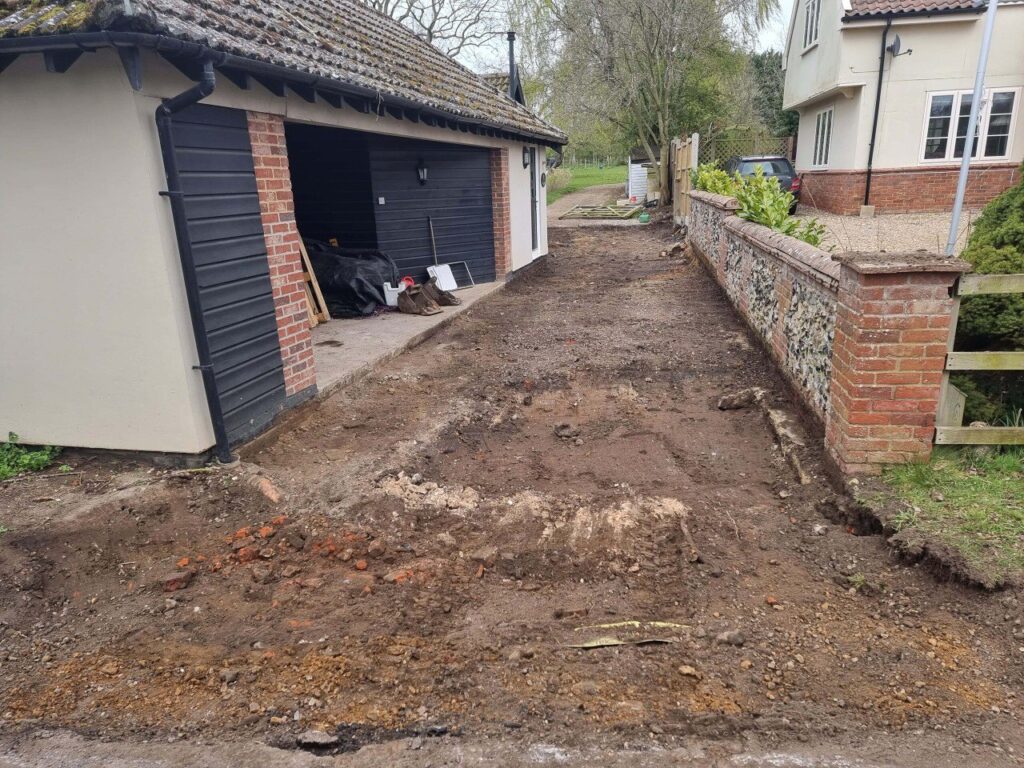Resin Driveways: How Weather Conditions Affect Tarmac Driveways and What You Can Do About It
Tarmac driveways have long been a popular choice for homeowners in the UK due to their durability and affordability. However, like any surface, tarmac is not immune to the effects of weather, which can lead to deterioration over time. At Littleport Driveways, we understand the importance of choosing the right material for your driveway, especially in a climate like Cambridgeshire’s, where seasonal changes can be quite dramatic. In this post, we explore how weather conditions affect tarmac driveways and discuss what can be done to maintain them or whether a resin driveway might be the better option for your property.
How Weather Conditions Impact Tarmac Driveways
- Sun Exposure and UV Damage
Prolonged exposure to the sun can cause tarmac to dry out, leading to fading and brittleness. The UV rays break down the binding agents in the tarmac, causing it to lose its flexibility and crack over time. This is especially noticeable during the summer months when temperatures are higher and sunlight is more intense. These cracks can worsen if not addressed, eventually leading to potholes. - Heavy Rain and Water Infiltration
In areas like Littleport, where rainfall is common, tarmac driveways are exposed to constant moisture. Poor drainage can result in water pooling on the surface, which, over time, can seep into cracks and lead to further damage. When water infiltrates the tarmac, it can weaken the underlying layers, leading to subsidence and uneven surfaces. Freezing and thawing cycles during the winter can exacerbate this issue, as water expands when frozen, causing further cracks. - Frost and Ice
Winter conditions pose a significant challenge for tarmac driveways. The freeze-thaw cycle, where water enters small cracks and freezes, causing expansion, is a leading cause of damage. Over time, this process widens cracks, leading to the formation of potholes. Additionally, the use of de-icing salts can contribute to the breakdown of tarmac surfaces, as these chemicals can degrade the binding agents in the tarmac. - Temperature Fluctuations
In the UK, where temperatures can fluctuate rapidly, tarmac surfaces expand and contract frequently. This constant movement can lead to stress fractures and eventually larger cracks if not properly maintained. Over time, this can cause significant damage to the driveway’s structure, resulting in costly repairs.
Maintenance Solutions for Tarmac Driveways
- Regular Sealing
To combat UV damage and water infiltration, it’s essential to apply a sealant to your tarmac driveway every few years. Sealing helps to restore the surface’s flexibility, protects against fading, and prevents water from penetrating the surface. A high-quality sealant also enhances the appearance of the tarmac, giving it a fresh, dark finish. - Prompt Repair of Cracks and Potholes
Addressing small cracks and holes as soon as they appear is crucial in preventing further damage. Filling cracks and potholes with appropriate tarmac repair products can extend the life of your driveway and prevent more significant issues from developing. - Improved Drainage
Ensuring proper drainage around your driveway is vital to prevent water from pooling. This can involve installing channels or redirecting water away from the surface. Good drainage minimises the risk of water infiltration and subsequent damage from freeze-thaw cycles.
Is a Resin Driveway a Better Alternative?
While tarmac remains a solid option, many homeowners are now opting for resin-bound driveways due to their enhanced durability and weather resistance. Resin driveways offer several advantages over tarmac, particularly in areas with variable weather conditions:
- Permeability: Resin driveways are porous, allowing water to drain through the surface rather than pooling on top. This feature greatly reduces the risk of water damage and helps maintain the driveway’s appearance.
- UV Stability: High-quality resin driveways are UV-stable, meaning they resist fading and maintain their colour, even with prolonged sun exposure.
- Flexibility and Durability: Resin-bound surfaces are more flexible than tarmac, making them less prone to cracking due to temperature fluctuations. They are also highly resistant to the growth of weeds and the effects of frost.
- Low Maintenance: Resin driveways require minimal upkeep compared to tarmac, as they don’t need regular sealing and are easier to clean.
Why Choose Littleport Driveways?
At Littleport Driveways, we specialise in both tarmac and resin driveway installations, offering tailored solutions that meet your specific needs and preferences. Our experienced team understands the challenges posed by the UK’s weather and provides expert advice on the best materials and maintenance strategies to keep your driveway looking its best.
Whether you’re interested in maintaining your existing tarmac driveway or exploring the benefits of a resin alternative, we’re here to help. We pride ourselves on delivering high-quality workmanship and exceptional customer service to homeowners in Littleport and across Cambridgeshire.
Conclusion
While tarmac driveways offer durability and affordability, they are not without their challenges when exposed to harsh weather conditions. Proper maintenance is key to preserving their lifespan and functionality. However, if you’re looking for a more weather-resistant and low-maintenance option, a resin-bound driveway might be the ideal solution for your property.
If you’re considering a new driveway or need advice on maintaining your current one, contact Littleport Driveways today. Let us help you choose the best option for your home, ensuring a driveway that’s both practical and aesthetically pleasing.
Call us on: 01353 881 093
Click here to find out more about Littleport Driveways
Click here to complete our contact form and see how we can help with your driveway needs.

